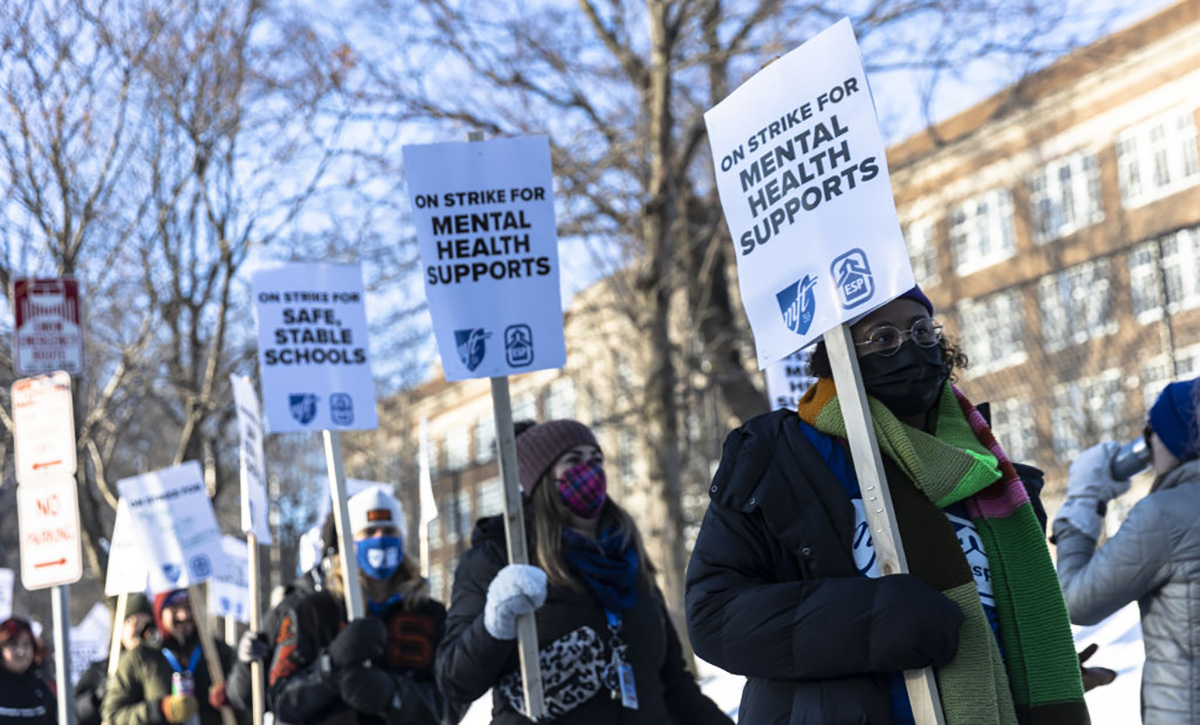Minneapolis Teacher Layoff Exemption Based on Race — But Not the Way You Think
Internal union tensions over diversity, seniority and discrimination led to contract provision after first strike in 50 years

Get stories like these delivered straight to your inbox. Sign up for The 74 Newsletter
When Minneapolis Public Schools and the city teachers union settled the first walkout in 50 years last March, the new contract contained a provision that was designed to protect educators of color from seniority-based layoffs. It reads:
“… if excessing a teacher who is a member of a population underrepresented among licensed teachers in the site, the district shall excess the next least senior teacher, who is not a member of an underrepresented population, for the reasons provided in Article 15.1.2.i.”
The referenced reasons are to “remedy the continuing effects of past discrimination by the district.” The provision will sunset “once the teachers in the district reflect the diversity of the labor market and the community served by the district.”
Well before the strike, Beth Hawkins reported on negotiations over layoff protections. Seniority waivers in general are very rare, but their inclusion in the Minneapolis contract excited only mild interest from the local press. The district in Robbinsdale, Minnesota, has a similar protection for probationary educators, which the union president said has saved the jobs of 12 teachers over the past five years. He also said it could allow the district to retain male teachers instead of women if the demographics warranted it.
There the issue sat until Aug. 14, when a Minnesota conservative news site ran a piece on it. From there, the story made the rounds until grabbing national headlines from the Associated Press.
Minneapolis Federation of Teachers President Greta Callahan and Vice President Marcia Howard appeared on ABC News to downplay the controversy.
“It’s coming out because some Minnesotan website decided to put it out there and the MAGA media picked it up and they were waiting for mainstream media to run with this story. It’s a non-story,” said Howard.
But for better or worse, it is a story, because it allows people to choose sides, debate and argue. The provision also raises legitimate questions about constitutionality and teacher diversity that are worth exploring. Judicial Watch, a conservative legal action organization, just filed suit against the Minneapolis school district and board on behalf of a local taxpayer over the issue.
But all this fails to acknowledge the very specific local reasons why this ended up in the Minneapolis teachers’ contract: The union has been riddled with racial tensions of its own.
“It’s about time that we call out the current Minneapolis Federation of Teachers union leadership for what it is: Racist,” reads the opening of an April 29 op-ed by seven union members, one of whom, Alexis Mann, challenged Callahan for the union presidency. Callahan was ultimately reelected with 82% of the vote.
The group filed a complaint with the union’s executive board, citing intimidation and disrespect from union officers as the group lobbied internally to ensure the layoff protections were included in the contract.
“White supremacy has and continues to anchor this union at the expense of educators of color and our beloved students of color,” reads the grievance.
The seven members claim that the layoff protections were not a priority for the union leadership until pressured by Black educators, and that attempts by the group to make striking teachers aware of the issue were turned away by the union’s strike captains.
“We felt like we were between two predominantly white institutions that didn’t see us. We were just kind of invisible,” said Alex Leonard, one member of the group.
The group was particularly concerned about picketing outside of the homes of school board members, several of whom are Black, citing the optics of “white mobs showing up on Black people’s lawns.”
“The anger of these educators is symptomatic of larger issues, and although I feel it is misdirected, every member needs to be heard,” responded Callahan.
The “larger issues” to which she refers could be just about anything. “Our fight is against patriarchy, our fight is against capitalism, our fight is for the soul of our city,” she said during the strike.
The union decided it needed this contract provision only because seniority in Minneapolis tended to discriminate on the basis of race and ethnicity. Only accusations of racism would cause Callahan and her officers to waive seniority provisions. The Minneapolis contract is at least a tacit admission that blind adherence to seniority can lead to detrimental outcomes.
Mike Antonucci’s Union Report appears most Wednesdays; see the full archive.
Get stories like these delivered straight to your inbox. Sign up for The 74 Newsletter

;)